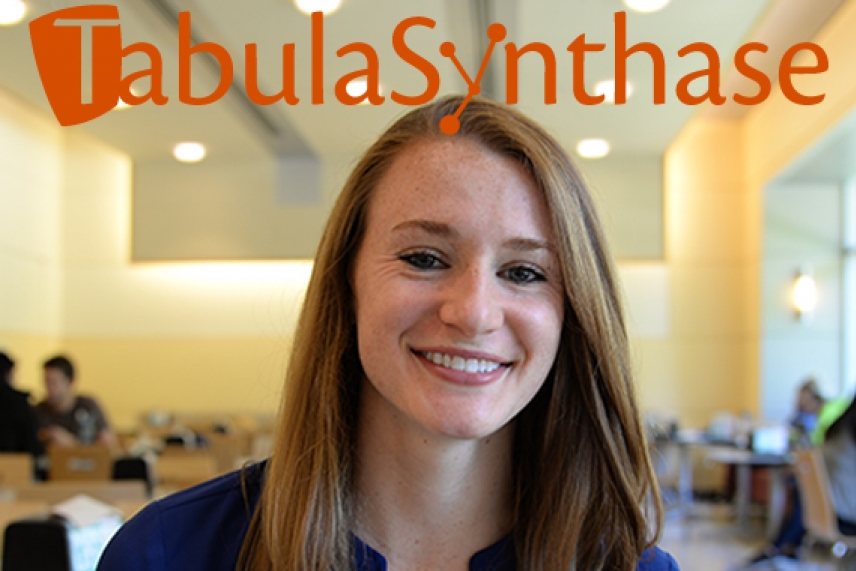
For new Whitehead Fellow Kristin Knouse, basic science offers the power to ask an unlimited number of questions
TabulaSynthase, the blog of Whitehead Institute, brings together ideas and perspectives from the Whitehead community and beyond.
Kristin Knouse joins Whitehead Institute this summer as its newest Whitehead Fellow. She is a firm believer in the ability of basic science and clinical medicine to inspire and advance one another—and firmly committed to pursuing practical solutions through bench research. But it took her awhile to get there.
“Growing up, I didn’t spend my days toiling at a toy microscope knowing that I would become a scientist,” says Knouse. “In high school, I spent most of my time in a television studio and thought I would pursue a career in broadcast journalism. However, I always had a fondness for my biology and health classes, and was especially interested in human physiology and disease. So, when I started college, I pursued both journalism and biology majors—thinking I might unify my interests by becoming a health correspondent for a news station."
That plan changed quickly with Knouse’s initial hands-on experience with biological research. “Through high school, I’d never been exposed to research, and assumed if you liked biology you became a doctor. At Duke I picked up a pipette for the first time,” she recalls, “and fell immediately and irreversibly in love with basic science research. I could go into the lab and ask an unlimited number of questions regarding fundamental principles of our own existence. It was the most liberating and empowering experience of my life."
Still, Knouse remained interested in the clinical applications of biological research and didn’t want to close the door on medicine as a career path. She decided to pursue a combined M.D.-Ph.D. degree, to gain both practical experience in treating patients and in-depth experience pursuing targeted biomedical questions. She joined the Harvard and Massachusetts Institute of Technology (MIT) M.D.-Ph.D. Program in 2010, earned her Ph.D. in biology in 2016, and her M.D. last month.
She conducted her Ph.D. research in the lab of renowned cancer investigator Angelika Amon, Kathleen and Curtis Marble Professor in Cancer Research, professor of biology at MIT, faculty member at the Koch Institute for Integrative Cancer Research at MIT, and Howard Hughes Medical Institute Investigator. There, Knouse created tools to identify deletions and duplications in the genome that are caused by errors in chromosome replication or segregation. Then, to investigate chromosome segregation directly in tissues, she turned to liver regeneration. She took advantage of the fact that hepatocytes—the primary cell type in the liver—can rapidly re-enter the cell cycle and divide following toxic injury or surgical resection of the organ. Her investigations have implications for understanding liver disease and cancer. But, most exciting for Knouse, this system provides a unique opportunity to advance the field of regenerative medicine.
Liver regeneration will be the focus of her investigations as a Whitehead Fellow—which provides Knouse with the rare opportunity to develop her own research program. Most recent Ph.D.’s undertake a postdoctoral fellowship in a senior researcher’s laboratory, pursuing that person’s scientific objectives.
Knouse’s work at Whitehead will be distinct in another way as well. “Many M.D.-Ph.D. graduates pursue a career combining bench research and clinical care,” she notes. “But as I went through my clinical rotations working with patients, I found myself more interested in the mechanisms underlying disease than in the one-on-one therapeutic relationship. I realized I would be more satisfied dedicating myself entirely to understanding basic biological processes and helping patients indirectly through these discoveries.”
Which begs the question, was completing medical school worth the effort? “Believe me, I have given a great deal of thought to that question,” Knouse responds, “As more time passes, the more confidently I can say yes. My clinical training has forever shaped how I approach science. For one, the deep understanding of human physiology gives me a broader context for my research. Rather than thinking exclusively about a cellular process, I also think about the function of that cell in a tissue, how that tissue integrates into the organism, and whether that process is disrupted in disease. That perspective has enabled me to make important connections that I may not have made without the medical training. Moreover, working directly with patients has provided an endless source of new questions and strong rationale for pursuing them.” Indeed, it’s given her a clear path for her research in coming years.
“In my graduate research, I exploited liver regeneration as a means of studying chromosome segregation directly in tissues. Then, throughout my clinical training, I encountered patients who had suffered from heart attack, stroke, spinal cord injury, and other conditions caused by the damage or loss of terminally differentiated cells like cardiomyocytes and neurons. These patients suffer lifelong impairment because the body doesn’t replace these lost cells, and there’s little we can do therapeutically for these patients. Those experiences prompted me to recall that hepatocytes can lie dormant for years but, when needed, rapidly regenerate the liver. I realized that understanding this ability could ultimately reveal novel approaches for treating disease.”
“I am eager to leverage the knowledge I’ve gained in my research and clinical training—and to build on the research systems I’ve created—to learn what gives these cells this unique regenerative capacity. Whitehead Institute, with its excellent technical facilities and its Faculty’s incredible breadth of biological knowledge, is the perfect environment to pursue that question.”
Topics
Contact
Communications and Public Affairs
Phone: 617-452-4630
Email: newsroom@wi.mit.edu


